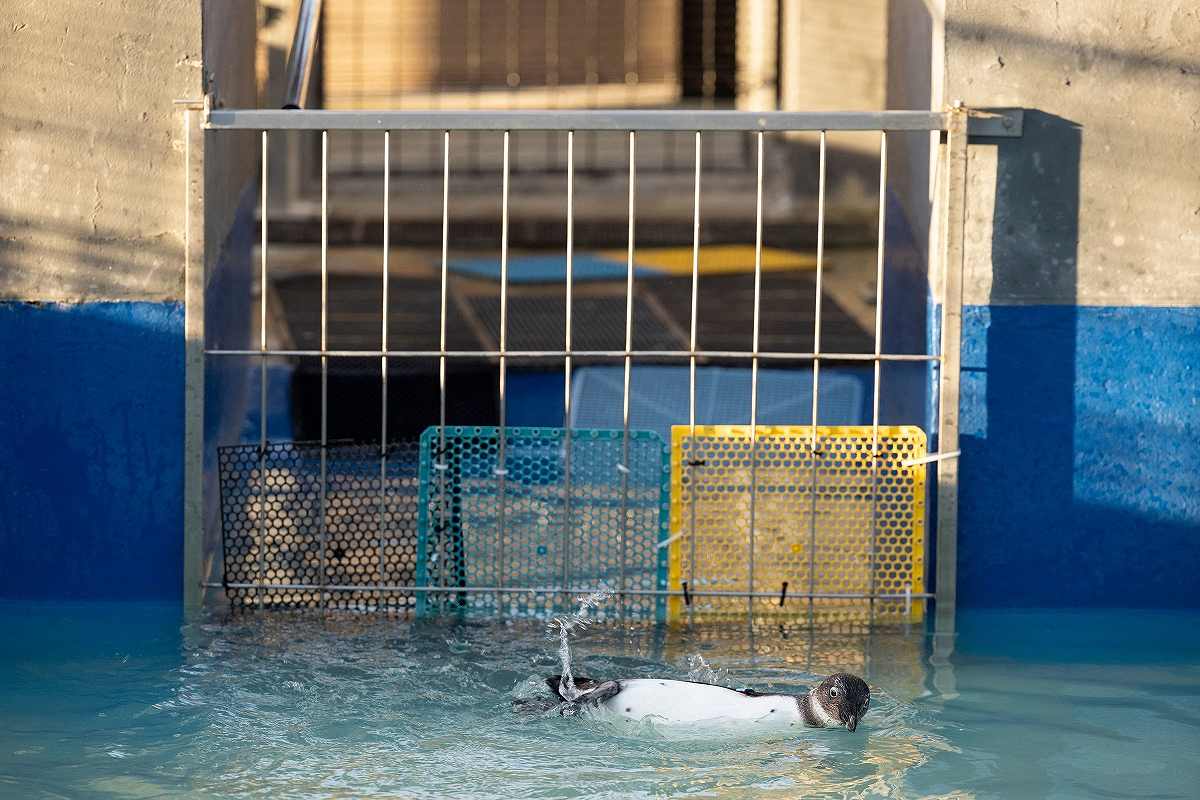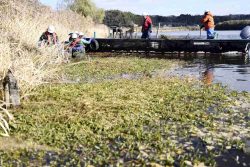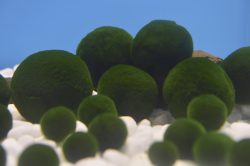
A penguin swims at the Southern African Foundation for the Conservation of Coastal Birds in Gqeberha, South Africa, on June 6.
16:52 JST, July 5, 2023
GQEBERHA, South Africa (AFP-Jiji) — A small fish is dangled under the beak of an emaciated penguin at a South African clinic, to whet the bird’s appetite.
The sickly animal is among dozens undergoing treatment in the coastal town of Gqeberha, where a dedicated rehabilitation center is on a mission to bring African penguins back from the brink of extinction.
“We are trying to reverse some of the human damage caused to these birds over the years,” said Caitlin van der Merwe, a seabird ranger at the Southern African Foundation for the Conservation of Coastal Birds.
Threatened by climate change and human activity, the endangered species, which waddles awkwardly on land but turns into a fast-swimming torpedo in the water, has suffered a drastic decline in numbers.
Around 50,000 mating pairs — penguins are monogamous — inhabited the shorelines of South Africa and Namibia three decades ago. Today the number has dropped to 10,000 pairs.
That’s a jaw-dropping 80% population decrease, which zoologists say is even more worrying given that a healthy penguin population is considered indicative of a healthy marine ecosystem.
“The species declining, that means there’s a big issue in the marine environment,” said Carl Havemann, who heads the penguin clinic.
Climate threat
The center is currently teeming with feathered patients.
Over the past two weeks, about 40 baby penguins have been transferred here from Bird Island, an islet home to one of Africa’s largest penguin colonies about 60 kilometers off Gqeberha, formerly known as Port Elizabeth.
Heavy rains have battered the island, washing away nests and chicks.
The little black and white birds traditionally dug their nests into a thick layer of guano — a mixture of droppings and remains that accumulate over time.
But the organic substance has been plundered for use as natural fertilizer, and the penguins now have to make do with branches or in cracks in the rocks, which make for a less sturdy home.
And for the first three months of their lives the birds are covered only by grey plumage that offers little protection from water and cold.
The rains caused many to drown or die of hypothermia.
“With climate change, weather events are becoming more and more extreme and these obviously impact the natural colonies,” Havemann says.
Footbath
Some survivors are being treated in the seabird rehabilitation center’s intensive care unit, where staff are busy disinfecting, stitching and bandaging wounds.
Footbaths, sardines and medicines are also part of the treatment.
In total, around 100 birds, both young and adult, are cared for in the clinic.
The goal is to return them to the wild in the shortest time possible, limiting interaction with humans to what is strictly necessary.
The penguins huddle together, their shoulders raised as if they are perennially cold.
Some are kept hydrated through a small tube inserted in their gullets. Desperate ones are euthanized.
For those who are fit enough, rehab continues in the pool.
“If they don’t swim, they don’t drink,” said van der Merwe, as she whispers soothing words to a small penguin furiously waving its wings while she holds it between her thighs.
It is suffering from borreliosis, an infectious disease caused by bacteria, and needs antibiotics.
Besides extreme weather events, African penguins are also threatened by diseases, overfishing and pollution.
Gqeberha is home to a major port and huge cargo ships refuel offshore.
Spills in the recent past have seen frantic attempts to rescue and clean up oil-tarred penguins.
At current rates of decline, African penguins could become extinct within a decade, according to the Environment Ministry.
“The ocean has such a complexity. If we take bits here and there, the whole system will collapse,” van der Merwe said.
Top Articles in Science & Nature
-

Japan Institute to Use Domestic Commercial Optical Lattice Clock to Set Japan Standard Time
-

Japan to Face Shortfall of 3.39 Million Workers in AI, Robotics in 2040; Clerical Workers Seen to Be in Surplus
-

Record 700 Startups to Gather at SusHi Tech Tokyo in April; Event Will Center on Themes Like Artificial Intelligence and Robotics
-

iPS Treatments Pass Key Milestone, but Broader Applications Far from Guaranteed
-

iPS Cell Products for Parkinson’s, Heart Disease OK’d for Commercialization by Japan Health Ministry Panel
JN ACCESS RANKING
-

Japan PM Takaichi’s Cabinet Resigns en Masse
-

Japan Institute to Use Domestic Commercial Optical Lattice Clock to Set Japan Standard Time
-

Israeli Ambassador to Japan Speaks about Japan’s Role in the Reconstruction of Gaza
-

Man Infected with Measles Reportedly Dined at Restaurant in Tokyo Station
-

Videos Plagiarized, Reposted with False Subtitles Claiming ‘Ryukyu Belongs to China’; Anti-China False Information Also Posted in Japan






















